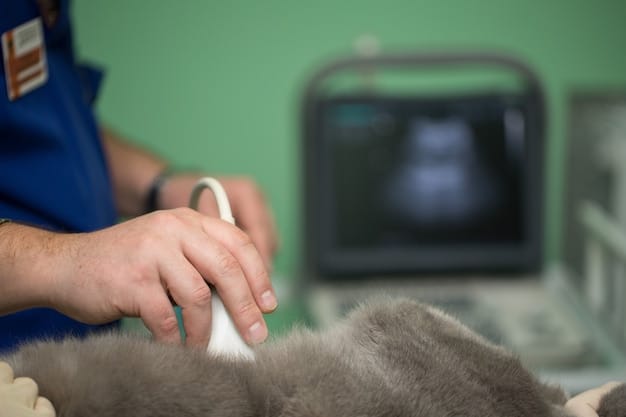Recent Advances in Veterinary Medicine and Pet Healthcare: 2024 Updates

Anúncios
Recent Updates: The Latest Advancements in Veterinary Medicine and Pet Healthcare involve innovations like gene editing for disease prevention, artificial intelligence for diagnostics, and personalized treatment plans based on an animal’s genetic makeup, significantly enhancing pet health outcomes.
Stay informed about the recent updates: the latest advancements in veterinary medicine and pet healthcare are transforming the way we care for our beloved animals, offering longer, healthier lives through cutting-edge technology and treatments.
Anúncios
Revolutionizing Diagnostics: AI and Imaging
Advancements in diagnostic technology are allowing veterinarians to detect and treat pet illnesses faster and more accurately. Artificial intelligence (AI) and advanced imaging techniques like MRI and CT scans are at the forefront of this revolution.
AI-Powered Diagnostics
AI is increasingly being used to analyze medical images, such as X-rays and ultrasounds, to identify subtle anomalies that might be missed by the human eye. This leads to earlier and more accurate diagnoses of conditions like cancer and heart disease.
Anúncios
Advanced Imaging Techniques
MRI and CT scans provide detailed images of internal organs and tissues, allowing veterinarians to diagnose a wide range of conditions, including tumors, spinal cord injuries, and joint problems. These technologies are becoming more accessible and affordable, making them a valuable tool for improving pet healthcare.

- Increased Accuracy: AI algorithms reduce the risk of human error in image interpretation.
- Faster Diagnosis: Advanced imaging provides immediate insights, speeding up the treatment process.
- Non-Invasive Procedures: Many diagnostic tools are non-invasive, minimizing discomfort for pets.
Ultimately, these technological advancements enable veterinarians to deliver more precise and effective care, improving the health and well-being of pets.
Gene Editing: Targeting Diseases Before They Develop
Gene editing holds tremendous promise for preventing and treating genetic diseases in pets. Techniques like CRISPR are being explored to correct faulty genes that cause conditions like muscular dystrophy and blindness.
CRISPR Technology
CRISPR (Clustered Regularly Interspaced Short Palindromic Repeats) is a revolutionary gene editing tool that allows scientists to precisely target and modify specific DNA sequences. In veterinary medicine, CRISPR is being investigated as a potential cure for inherited diseases.
Applications in Veterinary Medicine
Researchers are using CRISPR to target genes responsible for diseases like hypertrophic cardiomyopathy in cats and progressive retinal atrophy in dogs. The goal is to correct these faulty genes, preventing the development of these debilitating conditions.
- Preventative Care: Gene editing can prevent inherited diseases from manifesting.
- Targeted Treatment: CRISPR offers a precise approach to correcting genetic defects.
- Long-Term Solutions: Gene editing aims to provide lasting cures rather than just managing symptoms.
By addressing the root cause of genetic diseases, gene editing offers the potential for long-term cures and improved quality of life for pets.
Personalized Medicine: Tailoring Treatments to Individual Needs
Personalized medicine, also known as precision medicine, is an approach that takes into account an individual animal’s genetic makeup, lifestyle, and environment to tailor treatment plans. This approach is becoming increasingly common in veterinary medicine.

Genetic Testing
Genetic testing can identify predispositions to certain diseases, allowing veterinarians to implement preventative measures or start treatment early. This information can also be used to personalize medication dosages and choose the most effective therapies.
Individualized Treatment Plans
Personalized medicine involves creating treatment plans that are tailored to the specific needs of each animal. This may include adjusting medication dosages based on genetic factors, recommending specific diets based on metabolic needs, or choosing therapies that are most likely to be effective based on an animal’s genetic profile.
Benefits of Personalized Medicine
- Improved Treatment Outcomes: Tailored treatments are more likely to be effective.
- Reduced Side Effects: Personalized medication dosages minimize the risk of adverse reactions.
- Preventative Care: Genetic testing allows for proactive management of potential health issues.
Personalized medicine is transforming veterinary care by ensuring that each animal receives the most appropriate and effective treatment based on their individual characteristics.
The Rise of Telemedicine: Remote Veterinary Care
Telemedicine is rapidly expanding in veterinary medicine, providing pet owners with convenient access to veterinary care from the comfort of their homes. This is particularly beneficial for routine check-ups, follow-up appointments, and managing chronic conditions.
Benefits of Telemedicine
Telemedicine offers numerous advantages, including increased convenience, reduced stress for pets, and improved access to care for pet owners in remote areas. It also allows veterinarians to monitor patients remotely, track their progress, and make timely adjustments to treatment plans.
Applications of Telemedicine
Telemedicine is being used for a wide range of services, including consultations, medication refills, dermatology evaluations, and behavioral assessments. It is also playing an increasing role in post-operative care, allowing veterinarians to monitor patients’ recovery remotely.
- Convenience: Access veterinary care from anywhere with an internet connection.
- Reduced Stress: Avoid stressful trips to the veterinary clinic for routine check-ups.
- Improved Access: Connect with specialists and access advanced care remotely.
Telemedicine is revolutionizing veterinary care by making it more accessible, convenient, and efficient.
Nutrition and Preventative Healthcare
Advances in nutrition and preventative healthcare are playing a crucial role in extending the lifespan and improving the quality of life for pets. Tailored diets, supplements, and preventative medications are now widely available to address specific health needs.
Nutritional Advances
Veterinary nutrition has advanced significantly, with specialized diets available for pets with specific health conditions, such as kidney disease, diabetes, and allergies. These diets are formulated to provide the optimal balance of nutrients, support organ function, and manage symptoms.
Preventative Medications
Preventative medications, such as flea and tick preventatives, heartworm preventatives, and vaccines, are essential for protecting pets from common diseases and parasites. Newer medications are more effective and have fewer side effects, making them safer for pets.
- Tailored Diets: Specialized diets support the health of pets with specific conditions.
- Advanced Preventatives: Newer medications offer better protection with fewer side effects.
- Comprehensive Health: Preventative care keeps pets healthy and active longer.
By focusing on nutrition and preventative healthcare, pet owners can help their pets live longer, healthier lives.
Improving Surgical Techniques
Surgical techniques in veterinary medicine have seen significant advancements, leading to less invasive procedures, faster recovery times, and improved outcomes for pets. Minimally invasive surgery (MIS) and advanced anesthesia protocols are at the forefront of these improvements.
Minimally Invasive Surgery (MIS)
MIS involves performing surgery through small incisions using specialized instruments and cameras. This approach results in less pain, less blood loss, and faster recovery times compared to traditional open surgery. MIS is being used for a variety of procedures, including joint surgery, abdominal surgery, and tumor removal.
Advanced Anesthesia Protocols
Advanced anesthesia protocols involve using newer, safer anesthetic drugs and monitoring equipment to ensure that pets remain comfortable and stable during surgery. These protocols minimize the risk of complications and allow for faster recovery after surgery.
- Less Pain: Minimally invasive techniques reduce postoperative pain.
- Faster Recovery: Pets recover more quickly after MIS procedures.
- Improved Outcomes: Advanced surgical techniques lead to better results.
Advancements in surgical techniques are transforming veterinary care by making procedures safer, less painful, and more effective.
| Key Point | Brief Description |
|---|---|
| 🔬 Gene Editing | Using CRISPR to correct faulty genes, preventing diseases. |
| 🤖 AI Diagnostics | AI algorithms enhance accuracy in medical image analysis. |
| ⚕️ Personalized Medicine | Treatments tailored to individual genetic makeup for better results. |
| 📲 Telemedicine | Remote veterinary care for convenience and improved access. |
Frequently Asked Questions (FAQ)
AI is used to analyze medical images and detect anomalies, aiding in quicker and more accurate diagnoses of diseases like cancer and heart conditions in pets.
Personalized medicine tailors treatments to an animal’s specific genetic makeup, lifestyle, and environment, optimizing treatment outcomes and reducing side effects.
Telemedicine provides convenient access to veterinary care from home, reduces stress for pets, and improves access for owners in remote areas, enabling timely monitoring and treatment adjustments.
Advancements include minimally invasive surgery (MIS) and enhanced anesthesia protocols, leading to smaller incisions, faster recovery times, and reduced post-operative pain for pets.
Preventative medications, such as flea/tick and heartworm preventatives, along with vaccines, safeguard pets against common diseases and parasites, supporting their long-term health and quality of life.
Conclusion
The veterinary field is continually evolving with innovative advancements that promise a brighter future for pet healthcare. From gene editing and AI diagnostics to personalized medicine and telemedicine, these developments are extending lifespans, improving quality of life, and transforming the way we care for our beloved animal companions.






